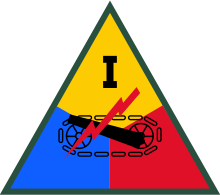I Armored Corps (United States)
Appearance
| I Armored Corps | |
|---|---|
 Shoulder sleeve insignia of the I Armored Corps. | |
| Active | 1940–43[1] |
| Country | |
| Branch | |
| Type | Corps |
| Engagements | World War II |
| Commanders | |
| Notable commanders | Adna R. Chaffee, Jr. George S. Patton, Jr. |
The I Armored Corps was a corps-sized formation of the United States Army that was active in World War II.
The corps made landfall in Morocco in French North Africa during Operation Torch, the Allied invasion of French North Africa, as the Western Task Force, under the command of Major General George S. Patton, the first all-American force to enter the war against the Germans.
Following the successful defeat of the Axis powers under Generalfeldmarschall Erwin Rommel in North Africa, in May 1943, I Armored Corps was redesignated as the Seventh Army on 10 July 1943 while at sea en route to the Allied invasion of Sicily as the spearhead of Operation Husky.
History
- Established – 15 July 1940 – at Fort Knox, Kentucky under the command of Major-General Adna R. Chaffee, Jr..[2][3]
- Change of command – November 1940 – Major-General Charles L. Scott assumes command
- Change of command – 15 January 1942 – Major-General George S. Patton assumes command[4][5][6]
- Transfer of Headquarters – January 1942 – to Fort Benning, Georgia
- Training – 26 March 1942 – Patton designated to set up Desert Training Center[5]
- Training – 10 April 1942 to 30 July 1942 – at Desert Training Center, California-Arizona Maneuver Area (DTC-CAMA)[7][8]
- Planning – 30 July 1942 – 5 August 1942 – Patton and staff does initial planning for Operation Torch in Washington, DC
- Planning – 5 August 1942 – 21 August 1942 – Patton and staff does higher level planning for Operation Torch in London, England
- Tactical Deception – 11 September 1942 – I Armored Corps redesignated as Western Task Force to carry out Operation Torch.
- Combat Mission – Operation Torch – 8 November 1942 – landed near Casablanca
- Cessation of Tactical Deception – 9 January 1943 – Western Task Force redesignated as I Armored Corps
- Change of command – 4 March 1943 – Patton reassigned to command II Corps after MG Lloyd Fredendall is relieved following the loss at the Battle of Kasserine Pass[9][10]
- Change of command – 15 April 1943 – Lieutenant-General Patton resumes command[11]
- Redesignated – 10 July 1943 – I Armored Corps becomes U.S. Seventh Army[1]
Subordinate units
- 3rd Infantry Division – 1 February 1943 to 15 July 1943
- 9th Infantry Division – 25 December 1942 to May 1943[12]
- 2nd Armored Division - 25 December 1942 to 15 July 1943
Heraldic items
Shoulder sleeve insignia
- Description: On an equilateral triangle with a green border, one point up, divided into three sections, the upper section yellow, the dexter section blue, and the sinister section red, a gun bendwise in front of a tank track and wheels all black and overall a red lightning flash bend sinisterwise. In the apex the Roman numeral "I" in black.
- Symbolism:
- Yellow, blue, and red are the colors of the branches from which armored units were formed.
- The tank tread, gun, and lightning flash are symbolic of mobility, power, and speed.
- The corps designation is in Roman numerals.
Distinctive unit insignia
- None approved.
References
- ^ a b Axlerod, Alan; Phillips, Charles (1998). "PATTON, George Smith". The Macmillan Dictionary of Military Biography. New York, NY, USA: Macmillan Publishers. p. 339. ISBN 0-02-861994-3.
- ^ Fort Knox, KY • History Archived 15 February 2006 at the Wayback Machine
- ^ Combined Arms Research Library
- ^ "Patton and Logistics of the Third Army: Lessons for Today's Joint Logistician". Airpower.maxwell.af.mil. Retrieved 21 May 2011.
- ^ a b Combined Arms Research Library
- ^ Biographies : Brigadier General Robert H. Strauss
- ^ "General Patton, World War II Desert Training Center, Needles Field Office, Bureau of Land Management California". Blm.gov. 25 March 2011. Retrieved 21 May 2011.
- ^ "Desert Training Center". Members.aol.com. Retrieved 21 May 2011.
- ^ "Patton Timeline". Historyinfilm.com. Retrieved 21 May 2011.
- ^ US Army World War II Corps Commanders Archived 11 June 2006 at the Wayback Machine
- ^ "Articles: Tunisa: WWII Change of Command, 1943". Historical Text Archive. Retrieved 21 May 2011.
- ^ "Hitler's Nemesis: The 9th Infantry Division – WWII G.I. Stories Booklet". Lone Sentry. Retrieved 21 May 2011.
Sources
- Gabel, Christopher R. (1991). The US Army GHQ Maneuvers of 1941. Washington, D.C.: United States Army Center of Military History/US Government Printing Office.
- Wilson, John B., Compiler (1999). CMH Publication 60-7:Armies, corps, divisions, and separate brigades. Washington, D.C.: United States Army Center of Military History/US Government Printing Office. p. 43. ISBN 0-16-049994-1.
{{cite book}}: CS1 maint: multiple names: authors list (link)
